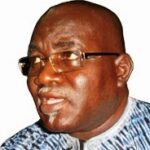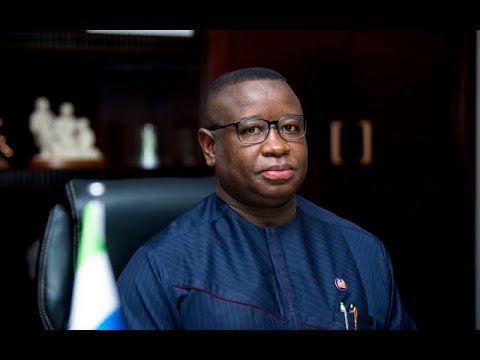By Dr. Julius Spencer former Minister of Information and Broadcasting in Pa Kabbah’s government
I first met Late President Kabbah close up sometime early in November 1993. I had obviously seen him and heard about him earlier when he retired from the UN and returned home in 1992 and was made chairman of the National Advisory Council to the NPRC regime. I was at the time editing the New Breed newspaper and prior to meeting him close up in 1993, we had published a few not so complementary articles about him.
My close up meeting with him was at a reception by the German Ambassador at the time, H.E Karl Prinz, a few days after I had been granted bail after being remanded in custody for about 2 weeks, following sedition and criminal libel charges myself and five other employees of the New Breed newspaper were facing. That was my first public outing after being released and Karl Prinz apparently had invited me to the reception because he wanted me to meet with some people he considered influential in the NPRC. After being at the reception for a while, Pa Kabbah arrived and Karl came over to me and told me he wanted to introduce me to him. I was a bit apprehensive, knowing that I had published some negative articles about him and so was quite surprised when we walked up to him, Karl introduced me and Pa Kabbah very warmly shook my hand and expressed sympathy about what I was going through at the time. He showed no sign of annoyance at the articles I had published. His reaction to me made quite an impression because I was expecting him to be hostile.
Fast forward to 1999 and I was Minister of Information and Broadcasting in Pa Kabbah’s government. I was also a member of the War Cabinet which was established after January 6. The War Cabinet included the Foreign Affairs, Finance, Internal Affairs ministers, the Attorney General, the Chief of Defence Staff, the Inspector General of Police, the Dep. Minister of Defence, and the National Security Adviser. Almost invariably, in those War Cabinet meetings, the majority of us disagreed with Pa Kabbah on something he wanted to do. One of these issues was releasing Foday Sankoh to go to Lome to consult with the Senior members of the RUF. Foday Sankoh, at that time was in the custody of the Sierra Leone government. Just before January 6, he had been taken out of Freetown to prevent him being released by the rebels, in case they overran Freetown. Pa Kabbah was also taken out by ECOMOG in the early hours of the morning of January 6, as the rebels were moving into central Freetown. In fact the ferry taking him out of the city had barely left the ferry terminal when it was overrun by the rebels.
After a couple of days, when none of us knew the whereabouts of President Kabbah, I got a message through ECOMOG, that he wanted me to meet him in Lungi to record a statement from him to the nation. I dutifully went to Lungi via an ECOMOG helicopter and was taken to see him at the presidential lounge. He was with Foday Sankoh. I recorded a statement from both of them announcing a cease fire and returned to Freetown feeling a bit angry. That anger was shared by most Cabinet members when they learnt about the ceasefire declaration because most of us believed the time was not ripe for that, since the rebels were occupying parts of the city. Anyway, I released the statement and gave an interview to the BBC announcing the ceasefire. Incidentally, this was the only time I expressed my personal view on an issue while I was minister because on being prodded by the interviewer, I said if it had been up to me, I would not have agreed to a ceasefire. Anyway, shortly after my interview Sam Bockarie (Maskita) was interviewed and he rejected the ceasefire, claiming Foday Sankoh must have been coerced into it. It was against this background that the international community felt that Foday Sankoh needed to meet with his men to convince them to go along with the peace process.
Despite the disagreement by most of us in the War Cabinet, Pa Kabbah insisted that it was in the interest of peace that Foday Sankoh be allowed to go join his men in Lome so we could have peace negotiations, and he was allowed to go. Apart from this issue, there were several other times we disagreed with Pa Kabbah on the approach he wanted to take, but eventually had to succumb to his wishes even though we were not fully convinced about the wisdom of what he wanted to do. He usually would disarm us by asking “don’t you want peace?” and of course none of us could say we didn’t want peace.
In all of this, one day stands out in my mind. We had as usual disagreed with the action President Kabbah wanted to take on an issue and we all left the meeting rather disturbed. As we left Pa Kabbah’s office where the meeting had taken place and were grumbling to each other in the lobby about the outcome, Dr. Jonah said to us “I hope God has given this man special wisdom that we cannot fathom”. Those words ring in my ears to this day, because with hindsight, I realised that this happened to be true. In fact, not only did he have wisdom that we could not fathom, he also had strength that was almost superhuman. Now I will tell you why I say so.
Pa Kabbah’s focus throughout his presidency was on achieving peace, national reconciliation and healing and he drove that process relentlessly. What to many of us seemed like weakness in the way he dealt with the RUF/AFRC, was, in fact, strength. He was willing to bend over backwards to accommodate them and make concessions which many of us disagreed with. I recall those meetings we had after the Lome Peace Accord and Foday Sankoh and Johnny Paul Koroma had returned to Sierra Leone; Foday Sankoh to take up appointment as Chairman of the Commission for the Management of Strategic Resources, National Reconstruction and Development (CMRRD); and Johnny Paul Koroma as Chairman of the Commission for the Consolidation of Peace (CCP). I avoided sitting close to Foday Sankoh during those meetings because, either in my imagination or in reality, he seemed to exude a malevolent spirit. I did not get the same feeling with Johnny Paul. Anyway, Foday Sankoh was usually contentious in those meetings, but unlike most of us, Pa Kabbah would not get annoyed. After the meetings, he would take Foday Sankoh into his office, calling him “my brother” (I used to cringe at hearing this) to talk to him and he usually got Sankoh to accept the decisions of the meeting.
Observing Pa Kabbah through the period of my interaction with him, I came to understand the true meaning of strength, particularly in conflict situations. Contrary to what most of us believe, strength is not being tough. It is not the ability to use force to overcome an opponent, nor is it an unwillingness to compromise.
Pa Kabbah taught me that real strength is the ability to focus on the goal and take any action necessary to achieve that goal, even though such action may seem like weakness. He taught me that strength is the ability to compromise with your opponents and be accommodating to your perceived enemies. He taught me that strength is the ability to disarm your opponents with kindness, rather than trying to destroy them, crush them or seek vengeance. Pa Kabbah taught me that the ability to bring people together is a strength, and he taught me that there is virtue in being a peacemaker.
I hope and pray that President Bio will become Pa Kabbah reincarnated with regard to his strength because we must not forget that Pa Kabbah is the only president we have ever had since the 1991 Constitution came into existence that has won a landslide victory in the first round, securing 70.1% of the votes during his second term election in 2002. This was a reward from the people for securing peace. Now, like then, the majority of Sierra Leoneans yearn for peace, stability and national prosperity.













